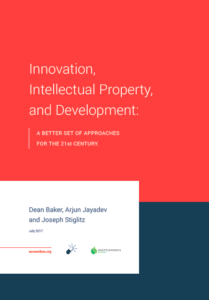 [University of Cape Town IP Unit Press Release, Link] Together with two institutions in India and Brazil, UCT’s IP Unit has just co-published a paper with the title ‘Innovation, Intellectual Property and Development: A Better Set of Approaches for the 21st Century.’ The paper is authored by Dean Baker, Associate Professor Arjun Jayadev and Nobel Prize winner and former Chief Economist of the World Bank Professor Joseph E. Stiglitz. It is part of a series of arguments from AccessIBSA: Innovation & Access to Medicines in India, Brazil & South Africa, a project supported by the Shuttleworth Foundation.
[University of Cape Town IP Unit Press Release, Link] Together with two institutions in India and Brazil, UCT’s IP Unit has just co-published a paper with the title ‘Innovation, Intellectual Property and Development: A Better Set of Approaches for the 21st Century.’ The paper is authored by Dean Baker, Associate Professor Arjun Jayadev and Nobel Prize winner and former Chief Economist of the World Bank Professor Joseph E. Stiglitz. It is part of a series of arguments from AccessIBSA: Innovation & Access to Medicines in India, Brazil & South Africa, a project supported by the Shuttleworth Foundation.
In the paper’s introduction, the authors state that “[i]f the knowledge economy and the economy of ideas is to be a key part of the global economy and if static societies are to be transformed into ‘learning societies’ that are key for growth and development, there is a desperate need to rethink the current [intellectual property] regime and to allow for a much less restrictive flow of information and knowledge. Moreover, if we are considering questions of ethics, the current regime is deeply regressive and inefficient.”
The paper aims to provide an intellectual basis to think about the relationship between development, intellectual property and innovation; where we currently are and what alternatives are available. The authors outline the basic logic for the implementation of intellectual property rights and detail alternatives to providing private monopolies to promote innovation. The paper then turn to the question of intellectual property rights and the process of development. The authors argue that both theory and the preponderance of historical evidence suggest that development, at least in its initial stages, is best promoted by a weaker intellectual property regime than reflected in TRIPS, or at the minimum a markedly different regime. The paper shows that the current global regime of intellectual property rights is inadequate in serving the purpose of economic development and welfare. This claim is supported by an extensive set of case studies in the areas of food security, education and climate change. Finally, the paper provides a simple laundry list of ways in which better laws could facilitate development and prevent the worst excesses of the global IP regime.
The paper is available in English and Portuguese under a Creative Commons licence, and in the next few weeks we will publish a series of short summaries of different parts of the paper on this website.




